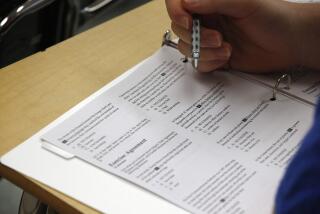Three Businesses Score With Schools’ Rush to Standardized Exams
Five years ago, National Computer Systems (NCS) did only one thing--score tests. The Minneapolis-based company had 400,000 square feet of office space devoted to processing the answer sheets that primary and secondary school students covered with little black pencil marks every spring.
Then the demand for student testing soared. States raised their educational standards and instituted rigorous exams to measure whether students and schools were meeting the new benchmarks. And each state wanted a different battery of tests, customized to assess how much students had learned of its particular curriculum.
Life at NCS changed. Its total office space has jumped 150%, to more than a million square feet. Its scanners, computers and human test-scorers are working at permanent facilities in six states and at temporary ones in 10 more, compared with a total of three facilities in 1995. And the demand for more tests is so great that NCS no longer just scores exams--it writes some of them too.
The testing boom has brought similar growth at the three companies that write most of the standardized exams used in public schools: Harcourt Educational Measurement, CTB/McGraw-Hill and Riverside Publishing. Although the companies will not release financial data, industry analysts say the three have reached a total of about $200 million in annual sales and their revenues have been growing by about 9% a year.
“This new push for higher educational standards in the states is really growing the market for these testing guys,” said Gail Kalinoski, managing editor of the Stamford, Conn.-based industry newsletter Educational Marketer.
Increased Scrutiny
But with the new business has come an increase in public scrutiny, an unsettling change for a culture that has tended to hide behind a screen of bewildering numerical complexities.
All three companies have felt the sting of resentment from many teachers and some parents who do not like the increased emphasis on standardized testing. And because the test results often carry major consequences--sometimes determining whether students are promoted and whether educators keep their jobs--any mistakes made by the companies now receive more publicity.
CTB came under fire last year when it scored student exams in New York City incorrectly, prompting school officials to send thousands of children to summer school that they did not need. Harcourt last year botched test scoring in some school districts in California.
Test company executives say that such mistakes are part of the business and that their error rate has not increased with the greater volume of work. Testing experts “are people who agonize over perfection,” said David W. Smith, president of assessments and testing at NCS. “They don’t go into educational measurement because they are fast and loose. They go into it in part because they are finicky people.”
Gerald W. Bracey, an educational psychologist and testing critic, disagrees. “I think the fact is the companies have taken on more than they can handle with the kind of professionalism they had in the past,” he said.
3 Control Business
Although NCS and the Toronto-based Thomson Corp. have started to get into test-writing, Harcourt, CTB and Riverside still control almost all of the business. It is difficult to distinguish their expansion from the growth of their much larger parent companies, all book publishers, but analysts say they rank in roughly this order:
1. Harcourt. The San Antonio-based company has about 40% of the testing market. Harcourt’s rise to the top was aided by a $28-million contract to test all California schoolchildren with the Stanford 9, a prize that came when state school officials could not resolve a bitter fight between proponents of the other two companies.
2. CTB. Based in Monterey, Calif., its biggest tests have been the California Achievement Tests and the California Tests of Basic Skills/TerraNova. It also has about 40% of the market, but is slightly behind Harcourt.
3. Riverside. The company produces the popular Iowa Test of Basic Skills and the Woodcock Diagnostic Reading Battery. It is based in Itasca, Ill., just west of Chicago, and has about 20% of the market.
Most of the work goes to just three companies because tests, like automobiles, are expensive to design and produce and can be profitable only if they have large national markets.
Many testing executives worked for school districts or state education departments before moving to private industry. Those contacts are a key selling point for the companies, which work closely with state and local school officials in developing and polishing test questions.
Company officials say the rapid growth in testing has put a strain on their efforts to find more experts in the field, which is known as psychometrics. “I don’t know anyone who says, ‘I am going to college to become a psychometrician,’ ” said Maureen DiMarco, vice president of educational and government affairs for Houghton Mifflin Co., which owns Riverside Publishing.
Job Opportunities
But the boom has created after-hours job opportunities for teachers, who write many of the test questions, and for university students, who score the essay questions that many of the new state tests demand.
The company executives are well aware that some educators think the whole testing process is misguided and takes time away from good teaching. Margie Jorgensen, a vice president at Harcourt, said she also has heard people say that the standards movement is just a way for her company to make money. Such critics do not understand how important tests are in helping children learn, she said.
“As a parent,” she said, “I believe the single biggest benefit of testing progress is to define quality work for all children equitably.” If there are no valid benchmarks, she said, teachers will not know where their children are in the learning process, nor how much further they have to go.
But as to whether school rankings and student promotion decisions should be based on test scores alone, testing company officials sound very much like the educators and parents who have criticized state officials for attaching such high stakes to the exams.
“The first people who are concerned about the use and misuse of test scores are the test publishers,” DiMarco said. “If all you are doing is giving the test and putting it up on a scoreboard, then you have wasted your money. The purpose of these instruments is to improve student achievement levels. . . . Every single one of us will say to you that you should not use one single data point to make decisions.”
More to Read
Inside the business of entertainment
The Wide Shot brings you news, analysis and insights on everything from streaming wars to production — and what it all means for the future.
You may occasionally receive promotional content from the Los Angeles Times.










